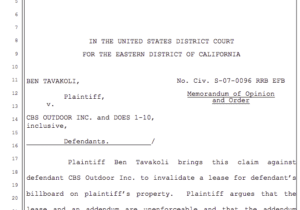 Make sure your leases binding on successors, heirs and assigns. That’s the lesson of Tavakoli v CBS Outdoor. Here’s a summary of the case.
Make sure your leases binding on successors, heirs and assigns. That’s the lesson of Tavakoli v CBS Outdoor. Here’s a summary of the case.
- In 1993 National Advertising entered into a lease with Fred Cullincini for the operation of a billboard along Highway 99 in Stockton CA. The lease had a 10 year term and was renewable at lessee’s option for an additional 10 year term and then renewed year to year thereafter. The lease also specified that it was binding on “heirs, successors, personal representatives, executors, administrators and assigns and assigns.” The lease also had no requirement for consent to assignment.
- Cullincini died. In October 2006 Max and Maria Burton purchased the property from Cullincini’s heirs. After purchasing the property the Burton’s signed an addendum extending the lease for an additional 20 years.
- In December 2006 Ben Tavakoli purchased the property from the Burtons. Tavakoli sued to cancel the lease claiming (1) The lease expired before the Burtons had signed an addendum; (2) Tavakoli never accepted the terms of the lease; (3) The lease was never submitted to probate by Fred Cullincini’s estate; (4) The billboard lacked government approval and; (5)The billboard was a nuisance.
- The US District Court for the Eastern District of California denied Tavakoli’s claims. The court concluded (1) Tavakoli incorrectly alleged that the lease had expired at the end of 20 years because the lease was automatically renewing year to year; (2) Tavakoli didn’t have the right to reject the lease because it was binding on successors and assigns and contained no language requiring his consent to an assignment; (3) The lease required no submission to probate because the lease terms were binding on heirs; (4) Tavakoli provided no facts to support the claim that the billboard was illegal; (5) Tavakoli provided no facts to support the claim that the billboard was a nuisance.
Insider’s take: You need to have strong language in your leases making them binding on successors, heirs, administrators and assigns. Also, if your lease is silent on consent to assignment, the law in most states is that no landlord consent is required on an assignment of a lease. This will protect you from a future property owner who wants to void the lease.
[wpforms id=”9787″]
Paid Advertisement

















